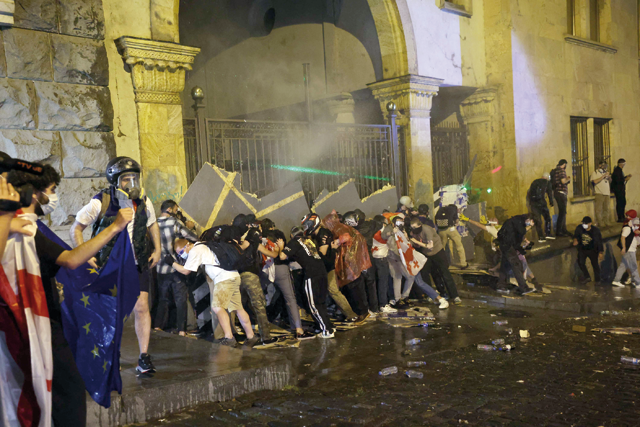You are here
10,000 rally in Georgia against controversial ‘foreign influence’ bill
By AFP - Apr 16,2024 - Last updated at Apr 16,2024
The ruling Georgian Dream party re-introduced the bill in parliament earlier this month, a year after it was forced to drop a similar measure following mass protests.
A former Soviet republic, Georgia has sought for years to deepen relations with the West, but the current ruling party is accused of trying to steer the mountainous Caucasus nation toward closer ties with Russia.
Chanting “No to the Russian law!” and waving Georgian and European Union flags, protesters gathered outside the parliament building as the legislature’s legal affairs committee held its first hearing on the proposed law.
“Massive peaceful demonstration of civil society in Tbilisi against the ‘Russian law’,” Salome Zurabishvili, Georgia’s staunchly pro-Western president, who is at loggerheads with the ruling party, wrote on X, formerly Twitter.
Riot police “with water and gas canons ready to pass to action against civilians defending their European future. Arrests are ongoing. Georgia will not surrender to resovietisation!!” she wrote.
Police detained at least four demonstrators at the peaceful rally, an AFP journalist witnessed.
Earlier, scuffles broke out at the committee hearing, as an opposition MP punched in the head a ruling party lawmaker who co-sponsored the bill.
The draft law has sparked outrage in Georgia, with many arguing it undermines Georgia’s longstanding bid for EU membership.
“We reject this law, which is anti-European, it’s a copy-paste from Russia’s draconian law,” said one of the demonstrators, student Maka Kvirikadze.
“Georgia won’t be admitted into the EU with such anti-democratic laws, that’s why we will not let them pass it,” said another protester, dentist Giorgi Lashkhi.
“Georgia belongs to Europe, it will never be Russia’s backyard again.”
‘Sabotaging European prospects’
Last week, around 8,000 people staged a rally in central Tbilisi, following the ruling party’s surprise announcement that it planned to pass the bill in May.
Georgian Dream — which controls 84 seats in the country’s 150-member parliament — can pass the legislation without backing from opposition MPs.
The bill will require any independent organisation that receives more than 20 per cent of funding from abroad to register as an “organisation pursuing the interests of a foreign power”.
That was a change from last year’s proposal, which used the term “agent of foreign influence”.
Georgian Dream said it changed the wording after accepting that the initial one had negative connotations.
The term “foreign agent” is rooted in the Soviet past and suggests such people are traitors and enemies of the state.
Analysts said that the ruling party — widely suspected of covert cooperation with the Kremlin — sees Western funding for Georgia’s pro-democracy NGOs and independent media as a challenge to its grip on power.
“Georgian Dream makes no secret of the fact that the law is aimed at neutralising Western influence,” political analyst Ghia Nodia told AFP.
“The party keeps saying that it steers Georgia towards the EU, but in fact they are sabotaging Georgia’s European prospects,” which are supported by some 80 per cent of population, according to opinion polls.
Sanctions risk
The European Commission has called on Tbilisi not to pass the legislation, saying it contradicts the democratic reform agenda which Tbilisi is required to pursue to progress on its path towards EU membership.
In December, the EU granted Georgia official candidate status but said Tbilisi would have to reform its judicial and electoral systems, reduce political polarisation, improve press freedom and curtail the power of oligarchs before membership talks are formally launched.
US State Department spokesman Matthew Miller said last week that passing the law would “derail Georgia from its European path” and “harm civil society organisations [and]... impede independent media organisations”.
“Stay tuned,” he said When asked if the US could slap sanctions on Georgia if it passed the bill, he said “stay tuned”.
Traditionally seen as a leader of democratic transformation among ex-Soviet countries, Georgia has in recent years been criticised for perceived democratic backsliding.
Related Articles
TBILISI — Tens of thousands of people rallied on Wednesday in Georgia against a controversial “foreign influence” bill, after parliament adv
TBILISI — At least 30,000 protesters took to the streets of Georgia for a third day running Thursday despite the ruling party's promise to d
TBILISI — Thousands of protesters marched through central Tbilisi on Saturday at a rally against a controversial "foreign influence" bill ba


















